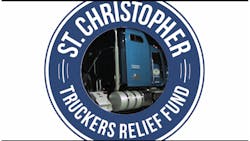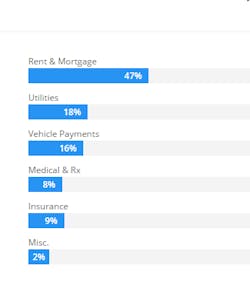St. Christopher Truckers Relief Fund takes unique approach to helping drivers
Former truck driver Michael Proctor, disabled from 21 years on the road, wasn't asking a lot. He needed batteries for his used motorized wheelchair, but he didn't have the money, and the cost wasn't covered by medical insurance.
"I had reached out to a couple of different organizations, and I was able to raise the money to purchase my chair." Proctor doesn't have the upper body strength to use a non-electric wheelchair. "Yes, my chair is used, but it's in excellent condition except that it had some issues with the batteries. I was having a Facebook chat with drivers who said, 'why don't you call St. Christopher?'"
Proctor had always given generously to the St. Christopher Truckers Relief Fund a non-profit group that aids truckers with household and other expenses after they've been slammed by high medical bills. The group raises money mainly from driver donations including the sale of wristbands, key chains, T-shirts and other items sold at truckstops. Now he needed their help, and he contacted them.
"About a month ago, we started talking," says 43-year old Proctor, who was diagnosed with spinal damage his doctors say was caused by years of vibration and jolts from poor roads and loading and unloading heavy cargo. "The organization found the right battery for my wheel chair, ordered it, paid for it, sent me a copy of the invoice and the tracking number. As of yesterday," Proctor continues, "my batteries were sent out and I should see them within the next week or so."
"We help drivers when they are in a bad place," says Donna Kennedy, executive director. "When an injury or illness has caused them financial difficulty, we're here to try to help them over the hump and pay their household expenses while they get back to work."
The most common expenses they help with are mortgages, utilities and car payments. "If you're not working then you're not getting a paycheck. You can't pay your mortgage; you can't keep your lights on. We're trying to help drivers do those things so they can get well and stay in their house and not have the additional stress of not having a home," Kennedy says.
Although The St. Christopher Truckers Development and Relief Fund (its full name) doesn't offer counseling services, they refer those in need to local community action centers and other agencies. "Our website lays out specifically, for example, where you can get help if you have cardiovascular, cancer issues or need general assistance with other issues. We know we can't do everything, but we try to point t drivers to as many other places as we can."
The group also offers free vouchers for flu, pneumonia and shingle vaccines through Walgreen's, Kroger and the Little Clinic. They've also started driver-driven smoking cessation groups in an effort to expand their preventative health programs.
According to charity rating groups like Guidestar, the Fund garners a high rating compared to many other organizations because of their low overhead, about 25 percent. The rest of their revenue goes to drivers.
The group takes a unique approach. Those in need do not receive money directly. Instead, as they did for Proctor, they dealt directly with the entity that needs to be paid for services or products.
Says Kennedy: "We want to track exactly where we're spending our money. We don't want you to buy cigarettes or use it for medical bills when you need to stay in your home instead. We give drivers information on how to negotiate medical bills, but that should be lower down their list of worries. We send money to Wells Fargo, [for mortgage payments, for example] and the drivers must send us a copy of the bill. Then we pay the bill holders directly."
She says that what is particularly heartbreaking to her are cases in which a driver is living in their truck and enters a hospital. "It can be really disturbing if they're not able to make their truck payment. We get calls like, 'I've had a heart attack. I'm in the hospital and they'll come take the truck if I can't make my payment.' That truck is their home."
For any group, raising money is a continuous challenge. "The majority of donations up until last year was from drivers, mostly through our Stand Together campaign that TA Petro started in 2010," Kennedy notes. "They sell wristbands for $1.00 and that was bringing in 80 percent of our donations. Last year we got some companies to contribute big donations. More companies are hearing about us and we're getting some support from them. (Disclaimer: Fleet Owner and other publications have contributed to the Fund.) Since we started it's been the drivers, the individuals, who have been giving more than corporations. We haven't extended into grants or anything like that yet, just donations… Drivers are very generous and reach out to each other because they understand each other." So far, the group has helped 1,837 drivers with almost $1.7 million in funding. The Fund was started in 2007 with the first driver receiving aid in 2008.
Recently, the organization formed a partnership with Fastport to help truckers who can no longer drive to find other employment through apprenticeship programs in the transportation industry. "It's a struggle for drivers who are perfectly able to work, but they don't feel that they can do anything other than drive, because that's what they've done their whole life, but now a medical problem prevents them from doing that," says Kennedy. "We're excited to be able to keep them in the industry that they know something about. They can still work instead of being on disability and barely getting by the rest of their lives."
For example, a driver may be an insulin-dependent diabetic, cannot tolerate wearing a CPAP for sleep apnea, or suffered a certain kind of stroke. These conditions rule out driving but they don't exclude other jobs in the transportation industry.
As for Proctor, he has no regrets about working in an industry that contributed to his disability. "I'm very young to be in the position that I'm in, but I love the industry. I will forever love it. I will always want to be a part of it. Even though I never went into the military, I wanted to give back to our country. That's why I became a truck driver. That was the whole reason for my driving career."
About the Author

Larry Kahaner
Larry Kahaner is an author, journalist, and former FleetOwner contributor.


